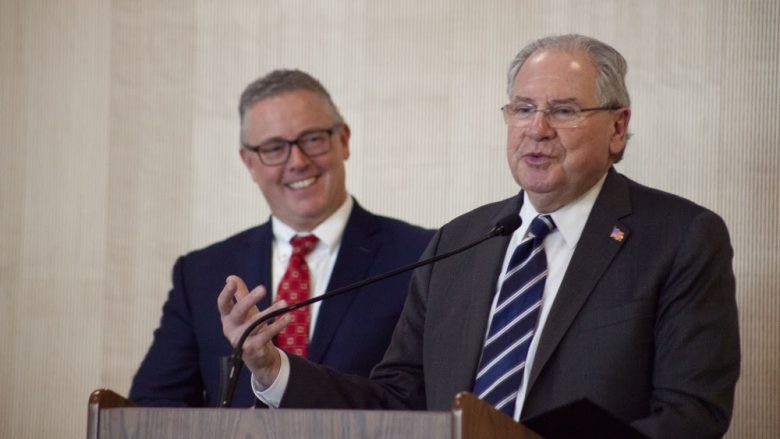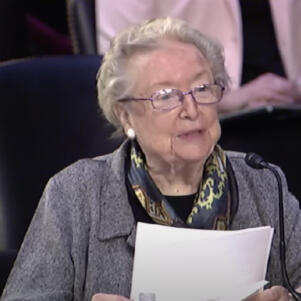A Thousand Million Dollars For Climate Change –
‘Green Shockwave’ Predicted for Massachusetts
By State House News Service | February 23, 2019, 9:00 EST
 State Representative Robert DeLeo (D-Winthrop), right, the speaker of the Massachusetts House of Representatives, announced a plan for a $1 billion climate-change grant program Friday, February 22, 2019 in Somerville, accompanied by state Representative Thomas Golden (D-Lowell), the chairman of the House Telecommunications, Utilities and Energy, left. [Photo: Chris Lisinski/SHNS]
State Representative Robert DeLeo (D-Winthrop), right, the speaker of the Massachusetts House of Representatives, announced a plan for a $1 billion climate-change grant program Friday, February 22, 2019 in Somerville, accompanied by state Representative Thomas Golden (D-Lowell), the chairman of the House Telecommunications, Utilities and Energy, left. [Photo: Chris Lisinski/SHNS] By Chris Lisinski
STATE HOUSE NEWS SERVICE
SOMERVILLE — Massachusetts House Speaker Robert DeLeo proposed a sweeping $1 billion environmental grant program Friday that, over the next decade, would fund municipal efforts to build renewable-energy infrastructure and invest in climate resiliency programs.
DeLeo (D-Winthrop), speaking alongside members of the Joint Committee on Telecommunications, Utilities and Energy after a tour of Somerville’s GreenTown Labs, said the funding will continue the state’s dedication to combating climate change while giving each city and town the flexibility to make locally-driven decisions.
“I represent two coastal communities,” DeLeo, whose district covers Winthrop and parts of Revere, said. “This isn’t all just about the water situation, flooding and all that. It deals with every single city and town, no matter what their needs may be. There will be money to address those needs.”
The proposal, referred to as the GreenWorks Resilient Communities Investment Plan, would allocate $1 billion over 10 years, or an average of $100 million each year, which DeLeo said would be funded by borrowing. Legislation will need to pass to authorize the program, and the speaker said he hopes to see that vote this session. A spokesman for DeLeo said Friday evening the bill had not yet been filed, but did not say when to expect a formal proposal to be offered.
If approved, communities could apply for grants through the state Executive Office of Energy and Environmental Affairs to fund installation of solar grids, electric vehicle charging stations, resiliency infrastructure, and more.
“We believe that these concrete local investments can make a difference in the real world,” DeLeo said. “Our cities and towns know their unique needs and areas of opportunity the best.”
Both the Legislature and the Baker administration have made addressing climate change a priority in recent years. In separate legislation (Senate Bill 10), Governor Charlie Baker proposed an increase in real-estate transfer taxes to raise $1 billion over the next 10 years for climate resiliency programs.
Lawmakers have filed several other bills on the topic, too, including one that would require Massachusetts to use all renewable energy for transportation, electricity, and heat by 2045.
DeLeo said the GreenWorks plan “is not meant to supplant any other ideas that are out there.”
“It’s a great opportunity to give our local communities from whatever part of the state the tools they need to address some of these serious issues that we’re facing in front of us over the next generation,” said the new House Ways and Means chairman, state Representative Aaron Michlewitz (D-North End). “The time is now, and I think this is a great opportunity to do so.”
State Representative Thomas Golden (D-Lowell), who chairs the Joint Committee on Telecommunications, Utilities, and Energy, described the Legislature’s work on climate change as “absolutely epic” and forecast a “green shockwave” following announcement of the GreenWorks proposal.
Another benefit of the program, DeLeo said, would be economic growth thanks to financial investment and the creation of green jobs. He likened it to an environmental version of MassWorks, a multimillion-dollar state infrastructure grant program.
Advocacy groups praised the idea on Friday, describing the funding as a needed investment. Sue Coakley, executive director of Northeast Energy Efficiency Partnerships, said in DeLeo’s press release that the emphasis on supporting community priorities “is a smart and powerful solution.”
Massachusetts Climate Action Network executive director Carol Oldham said in an interview Friday, February 22 that the proposal “sounds fantastic.” She hopes to see a significant portion of funding go toward mitigation plans.
“One of the issues that I know a lot of us in the environmental community and the climate community have been talking about is that resilience is going to be very expensive for a lot of communities in Massachusetts over the next decade,” she said. “It has to be done. It’s not optional, but it’s not going to be cheap.”












